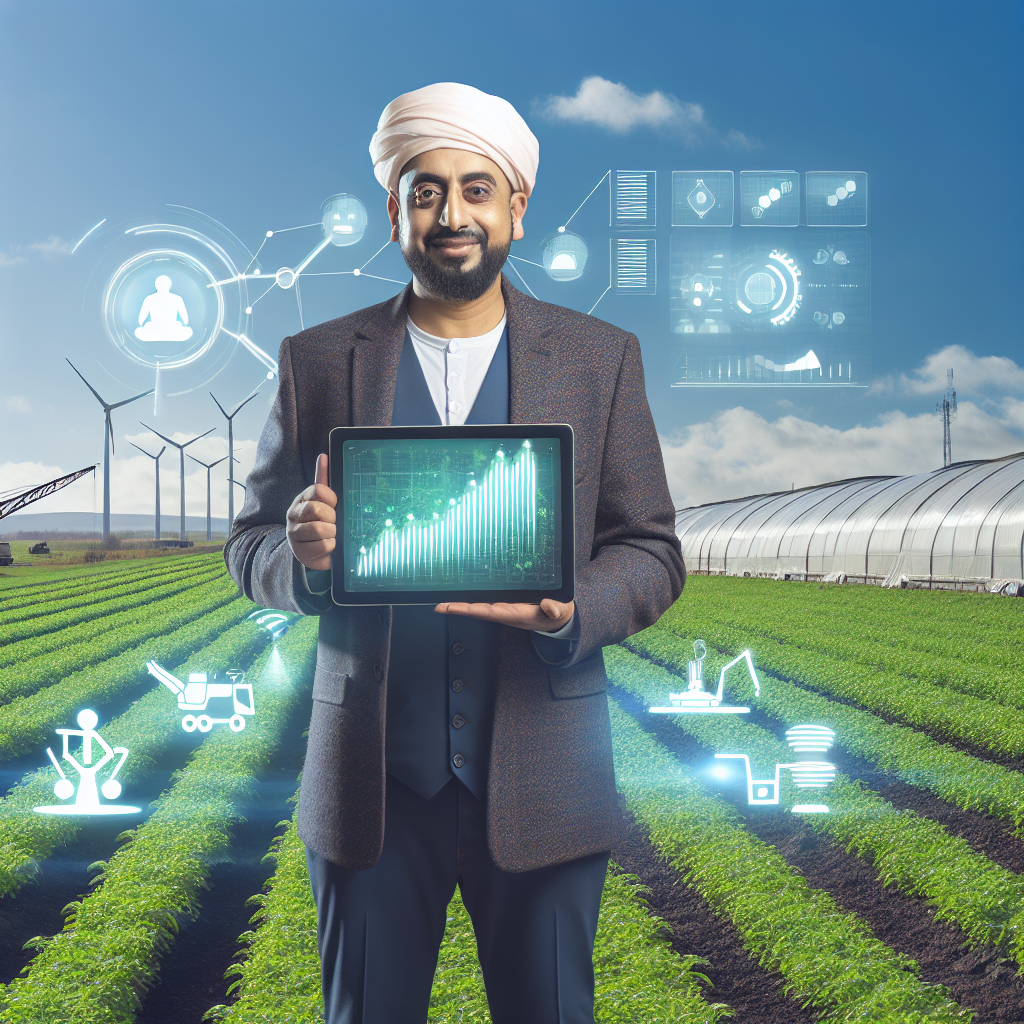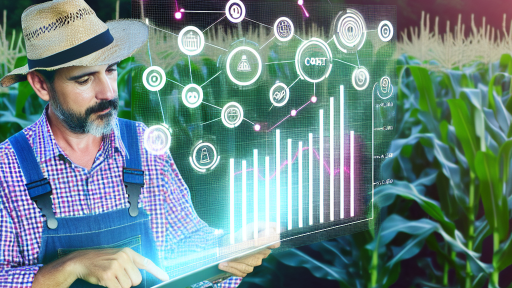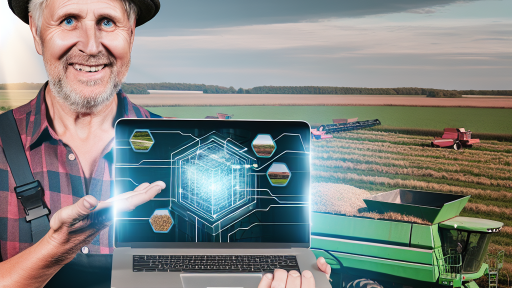Introduction to AI in Agriculture: An Overview
Artificial Intelligence is revolutionizing agriculture today.
Farmers increasingly rely on AI technologies for various tasks.
This reliance leads to improved efficiency and productivity.
Defining AI in Agriculture
AI encompasses machine learning, data analytics, and robotics.
These technologies help farmers make better decisions.
Additionally, they enable precise monitoring of crop health.
Current Applications of AI Technologies
- Predictive analytics for yield forecasting enhances planning.
- Automated irrigation systems optimize water usage significantly.
- Drones equipped with imaging technologies monitor crop conditions effectively.
Benefits of Incorporating AI
Utilizing AI minimizes resource waste on the farm.
It also increases crop yields significantly without harming the environment.
Moreover, AI provides valuable insights into soil health.
Challenges and Considerations
Implementing AI technology can involve high upfront costs.
Additionally, technical training for farmers is essential.
Furthermore, data privacy remains a critical concern.
Benefits of Implementing AI Technologies on Farms
Improved Crop Management
AI technologies enhance crop management significantly.
Farmers can analyze soil health with precision.
This analysis helps in optimizing crop selection.
Transform Your Agribusiness
Unlock your farm's potential with expert advice tailored to your needs. Get actionable steps that drive real results.
Get StartedMoreover, predictive analytics aids in forecasting yields effectively.
Data insights enable better decision-making for planting schedules.
Increased Operational Efficiency
AI streamlines farm operations by automating repetitive tasks.
Robotic systems handle planting and harvesting with speed.
This automation reduces labor costs significantly.
Furthermore, AI-driven machinery operates with greater accuracy.
As a result, resource wastage decreases dramatically.
Enhanced Pest and Disease Management
Implementing AI improves pest and disease detection.
Farmers can utilize sensors to monitor crop conditions continuously.
Machine learning algorithms identify potential outbreaks early.
This proactive approach allows for timely interventions.
Consequently, crop loss is minimized effectively.
Data-Driven Decision Making
AI empowers farmers with comprehensive data analytics.
Farmers gain insights into market trends and consumer preferences.
This information supports strategic planning for product sales.
Moreover, it aids in optimizing supply chain logistics.
As a result, farmers can increase profitability and sustainability.
Resource Management
AI technologies facilitate better resource management on farms.
Farmers can monitor water usage efficiently with AI tools.
This ensures sustainable irrigation practices are implemented.
Additionally, AI assists in optimizing fertilizer application.
This optimization enhances soil health and crop productivity.
Key AI Technologies Revolutionizing Farming Practices
Precision Agriculture
Precision agriculture utilizes AI to analyze field data.
This technology enhances resource management and crop yields.
Showcase Your Farming Business
Publish your professional farming services profile on our blog for a one-time fee of $200 and reach a dedicated audience of farmers and agribusiness owners.
Publish Your ProfileFarmers can now target specific areas for irrigation or fertilization.
Consequently, they reduce waste and increase efficiency.
Machine Learning for Crop Monitoring
Machine learning algorithms track crop health using satellite imagery.
These tools identify diseases and pests at early stages.
Farmers receive insights for timely interventions.
As a result, this reduces crop loss significantly.
Automated Farming Equipment
AI automates various farming machinery, improving productivity.
Robotic harvesters and drones assist in monitoring fields.
These machines operate with precision to minimize human labor.
Subsequently, they help farmers focus on strategic tasks.
Predictive Analytics for Yield Prediction
Predictive analytics enables farmers to forecast crop yields.
AI analyzes weather patterns and soil conditions for accurate predictions.
This helps farmers make informed decisions about planting and harvesting.
Eventually, they can optimize their production schedules.
Smart Irrigation Systems
Smart irrigation systems use AI to monitor moisture levels.
These systems automatically adjust water usage based on crop needs.
Such efficiency conserves water resources in farming.
Farmers can thus reduce costs and improve yield quality.
Supply Chain Optimization
AI streamlines the supply chain from farm to market.
It analyzes demand patterns to enhance logistics planning.
Farmers can make timely decisions on product distribution.
Consequently, this minimizes waste and improves profitability.
Find Out More: How Automated Machinery Reduces Labor In Agriculture
Case Studies: Successful AI Adoption in Agriculture
Precision Agriculture at GreenFields Farms
GreenFields Farms implemented AI-driven precision agriculture techniques.
The farm used sensors and drones to monitor crops.
By collecting data on soil conditions, they optimized water usage.
This led to a significant reduction in water wastage.
Furthermore, crop yields increased by 20% in one season.
Pest Management Innovations by AgroTech Solutions
AgroTech Solutions adopted AI for pest management.
They developed an app that identifies pests through images.
This app provides tailored pest control recommendations.
Farmers experienced a 30% decrease in pesticide use.
Moreover, overall crop health improved significantly.
Data-Driven Decisions at Harvest Innovations
Harvest Innovations utilizes AI for predictive analytics.
Their platform forecasts crop prices and demand trends.
Farmers can plan their planting strategies accordingly.
This proactive approach has minimized financial risks.
Consequently, profitability increased across multiple crops.
Smart Irrigation Systems by AquaSmart
AquaSmart introduced AI-driven smart irrigation systems.
These systems use real-time weather data for irrigation scheduling.
Showcase Your Farming Business
Publish your professional farming services profile on our blog for a one-time fee of $200 and reach a dedicated audience of farmers and agribusiness owners.
Publish Your ProfileAs a result, water consumption decreased by 40%.
Additionally, crop yields remained high despite using less water.
Farmers have praised the ease of use and efficiency.
Livestock Monitoring with FarmSense
FarmSense integrated AI for livestock monitoring.
Their system tracks animal health and behavior using sensors.
Farmers receive alerts for any health concerns immediately.
This proactive monitoring has reduced mortality rates by 15%.
Furthermore, the overall productivity of livestock doubled.
Implications of Successful AI Adoption in Agriculture
These case studies illustrate successful AI applications in agriculture.
Farmers have achieved improved efficiencies and sustainability.
The future of agriculture continues to look promising with AI.
Discover More: Transforming Farm Operations Through Blockchain-Based Supply Chains
Challenges and Barriers to AI Integration in Farming
Understanding the Current Landscape
The farming sector faces numerous hurdles in AI integration.
Many farmers lack access to modern technology.
Furthermore, limited digital literacy affects effective implementation.
These issues hinder the adoption of AI-driven practices.
Financial Constraints
Implementing AI technology often requires significant investment.
Small-scale farmers struggle to afford these costs.
Additionally, funding for technology adoption is often scarce.
Consequently, many farmers resist changing traditional practices.
Data Management Challenges
Efficient AI systems rely on high-quality data.
Farmers often lack the systems to collect relevant data.
Moreover, integrating data from various sources can be complex.
This complexity can overwhelm farmers unfamiliar with technology.
Regulatory and Policy Issues
A complex regulatory environment impedes rapid AI adoption.
Policies often lag behind technological advancements.
This discrepancy creates uncertainty for farmers considering AI.
As a result, many remain hesitant to embrace new solutions.
Cultural Resistance to Change
Long-held traditions influence farming methods significantly.
Farmers may be skeptical of technology’s effectiveness.
Additionally, change can provoke fear regarding job security.
Therefore, many choose to rely on familiar practices.
Infrastructure Limitations
Rural areas often lack the necessary infrastructure for AI.
Internet connectivity remains a major hurdle in many regions.
Inadequate power supply can also obstruct technology usage.
Consequently, farmers may struggle to utilize advanced tools.
Gain More Insights: How Drones Enhance Crop Monitoring And Management

Future Trends: The Role of AI in Sustainable Agriculture
Integration of AI Technologies
Farmers increasingly incorporate AI technologies into their operations.
This integration enhances decision-making and boosts productivity.
For example, AI-driven machines can optimize planting schedules.
Showcase Your Farming Business
Publish your professional farming services profile on our blog for a one-time fee of $200 and reach a dedicated audience of farmers and agribusiness owners.
Publish Your ProfileAdditionally, AI systems analyze vast amounts of agricultural data.
Data-Driven Insights
Data-driven insights empower farmers to make informed choices.
With AI, they can track weather patterns and market trends effectively.
This knowledge helps them anticipate issues and act accordingly.
Consequently, farmers can reduce waste and maximize yield.
Precision Agriculture
AI enables precision agriculture techniques for improved efficiency.
Farmers utilize drones equipped with AI for real-time monitoring.
These drones assess crop health and soil conditions continually.
Moreover, AI applications manage irrigation systems efficiently.
This approach optimizes water usage, supporting sustainability.
Pest and Disease Management
AI plays a crucial role in pest and disease identification.
Machine learning models detect issues before significant damage occurs.
Farmers can respond promptly, minimizing crop loss and resource waste.
Automation and Robotics
Robotics powered by AI significantly reduce manual labor on farms.
Robotic systems undertake tasks like harvesting and planting accurately.
This technology not only saves time but also lowers operational costs.
Furthermore, it enhances safety for workers in challenging environments.
Consumer Insights and Market Trends
AI tools analyze consumer preferences to forecast demand.
This data allows farmers to adjust their production strategies accordingly.
As a result, they can align their offerings with market needs.
This practice enhances profitability while supporting sustainability goals.
Regulatory Compliance and Sustainability Practices
AI assists farmers in meeting regulatory compliance efficiently.
Automated systems monitor and document sustainable practices.
This transparency fosters trust with consumers and regulatory bodies.
Moreover, it highlights the commitment to environmentally friendly agriculture.
Delve into the Subject: The Key Benefits Of Agri-Fintech Solutions For Small Scale Farmers
Strategies for Farmers to Start Using AI Solutions
Assess Your Farm Needs
First, evaluate the specific needs of your farm.
Identify areas where efficiency can improve.
For example, consider crop yields, pest control, and resource management.
This assessment will guide your AI adoption strategy.
Research Available AI Technologies
Next, explore the different AI technologies available for agriculture.
Look into precision agriculture tools and data analysis software.
Furthermore, investigate machine learning applications for predictive analytics.
Each technology can offer unique benefits.
Engage with AI Experts
Connecting with AI professionals can provide valuable insights.
These experts can help you identify the right solutions.
Consider attending agricultural tech conferences to network.
Additionally, seek out online forums and webinars.
Start Small with Pilot Projects
Implement AI solutions through small pilot projects first.
For instance, begin with one crop or one section of your farm.
Showcase Your Farming Business
Publish your professional farming services profile on our blog for a one-time fee of $200 and reach a dedicated audience of farmers and agribusiness owners.
Publish Your ProfileThis approach reduces risk and allows for adjustments.
Track results meticulously to evaluate effectiveness.
Invest in Training
Train your staff on new AI technologies.
Provide them with the necessary skills to operate new systems.
Invest in workshops and hands-on training sessions.
Engaged and knowledgeable employees enhance success rates.
Utilize Data Effectively
Collect and analyze data generated by AI tools.
Data-driven insights can inform decision-making processes.
Utilize software to visualize and interpret this data.
This step ensures you’re using resources optimally.
Network with Other Farmers
Connect with peers who have adopted AI solutions.
Sharing experiences can lead to valuable advice and tips.
Consider joining local agricultural organizations.
Group discussions often yield practical insights.
Continuously Monitor and Adapt
Finally, continuously monitor the performance of AI systems.
Be open to making adjustments based on results.
Staying flexible allows you to achieve the best outcomes.
Fostering innovation will keep your farm competitive.




